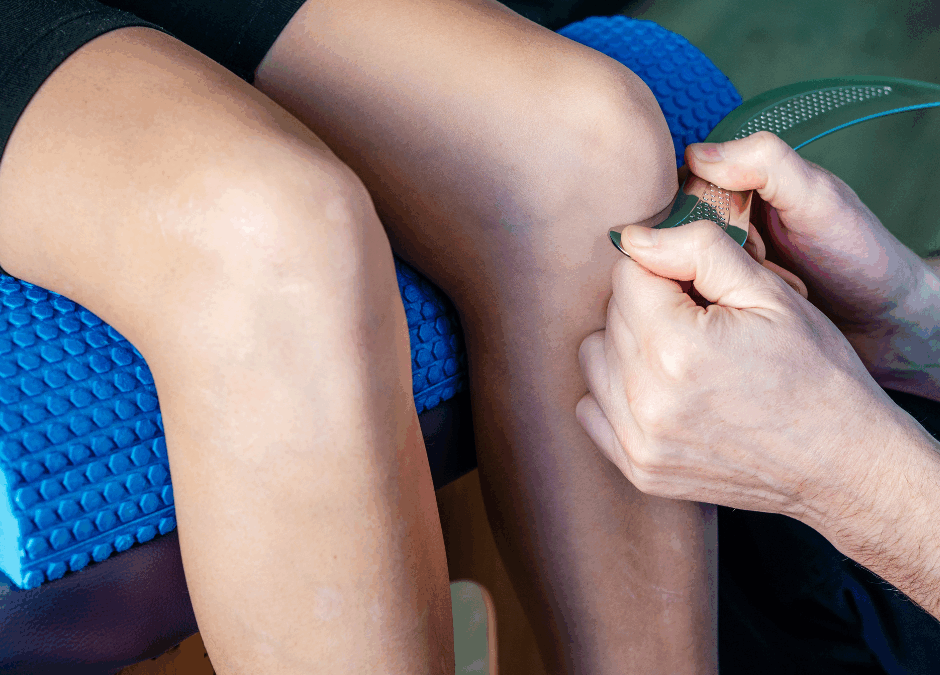Have you ever felt a sharp pain just below your kneecap after running or jumping? That pain may be more than just soreness—it could be patellar tendinopathy, also known as jumper’s knee.
This condition is common among athletes of all ages, especially those participating in high-impact sports like basketball, volleyball, soccer, ice hockey, and track and field. These sports involve repetitive stress from jumping, sprinting, and changing directions, which can place excessive strain on the patellar tendon over time.
What Is Patellar Tendinopathy?
Patellar tendinopathy is an overuse injury that affects the patellar tendon, the thick band of tissue that connects your kneecap (patella) to your shinbone (tibia). This tendon plays a crucial role in helping you straighten your knee and absorb impact during movement.
When the patellar tendon is overstressed without enough recovery time, it can become inflamed, irritated, and painful, especially during physical activity.
What Causes Jumper’s Knee?
Patellar tendinopathy typically develops gradually and is most often caused by repetitive strain and poor recovery. Contributing factors include:
-
Repetitive activities like running, jumping, sprinting, or squatting
-
Sudden increases in training intensity or volume
-
Inadequate warm-up or post-activity recovery
-
Poor biomechanics such as:
-
Weak glutes
-
Tight quads or hamstrings
-
Limited ankle mobility
-
Improper movement patterns
-
Common Symptoms of Patellar Tendinopathy
If you’re dealing with jumper’s knee, you may notice:
-
Pain or tenderness along the patellar tendon, just below the kneecap or at the top of the shinbone
-
Pain that worsens with jumping, running, or squatting
-
Swelling or inflammation near the tendon
-
Stiffness, especially after prolonged sitting or when going up and down stairs
If these symptoms sound familiar, it’s important to consult a healthcare provider such as a physical therapist, athletic trainer, or sports medicine physician for a proper diagnosis and treatment plan.
How to Treat Jumper’s Knee
Early intervention is key to preventing chronic issues. Here’s what to do:
1. Manage Symptoms and Modify Activities
-
Apply ice for 15–20 minutes a few times a day
-
Consider TENS therapy, soft tissue massage, or laser therapy
-
Use NSAIDs (as recommended by a healthcare provider)
-
Reduce or avoid activities that worsen the pain
2. Start a Rehab Program
A progressive rehab plan helps improve mobility, strength, and flexibility. Common exercises include:
-
Quad sets
-
Wall sits
-
Clamshells
-
Mini squats
Your physical therapist can guide you through a personalized program that addresses the root causes of the pain.
3. Gradually Return to Sport
As symptoms improve, work with a professional to safely and gradually reintroduce activity. This helps reduce the risk of reinjury or setbacks.
Can You Prevent Patellar Tendinopathy?
Absolutely. To reduce your risk of jumper’s knee, incorporate these preventative strategies into your training routine:
-
Warm up thoroughly before every workout
-
Strengthen your core and lower body muscles
-
Cross-train to reduce repetitive impact
-
Wear supportive, sport-specific footwear
-
Listen to your body and prioritize recovery
Final Thoughts
Patellar tendinopathy can be frustrating, especially for athletes and active individuals—but it’s manageable. With early diagnosis, proper treatment, and a personalized rehab plan, you can recover fully and return to the activities you love.
If knee pain is interfering with your workouts or daily life, don’t ignore it. The sooner you address it, the sooner you’ll be on your way to moving pain-free and stronger than ever.
Get Back in the Game with Compete Sports Performance & Rehab
At Compete Sports Performance & Rehab, we specialize in helping athletes and active individuals recover faster, perform better, and stay injury-free. Whether you’re dealing with jumper’s knee, rehabbing from a sports injury, or looking to improve your performance safely, our expert team of certified athletic trainers and sports rehab specialists is here to help.
- One-on-one personalized rehab
- Advanced recovery tools & techniques
- Performance training tailored to your sport
Don’t let pain sideline you. Book your evaluation with Compete Sports Performance & Rehab today and take the first step toward long-term recovery and peak performance.
Book your session here 👉 https://competeperformance.com/book-now/
Serving Lake Forest and Yorba Linda, California

